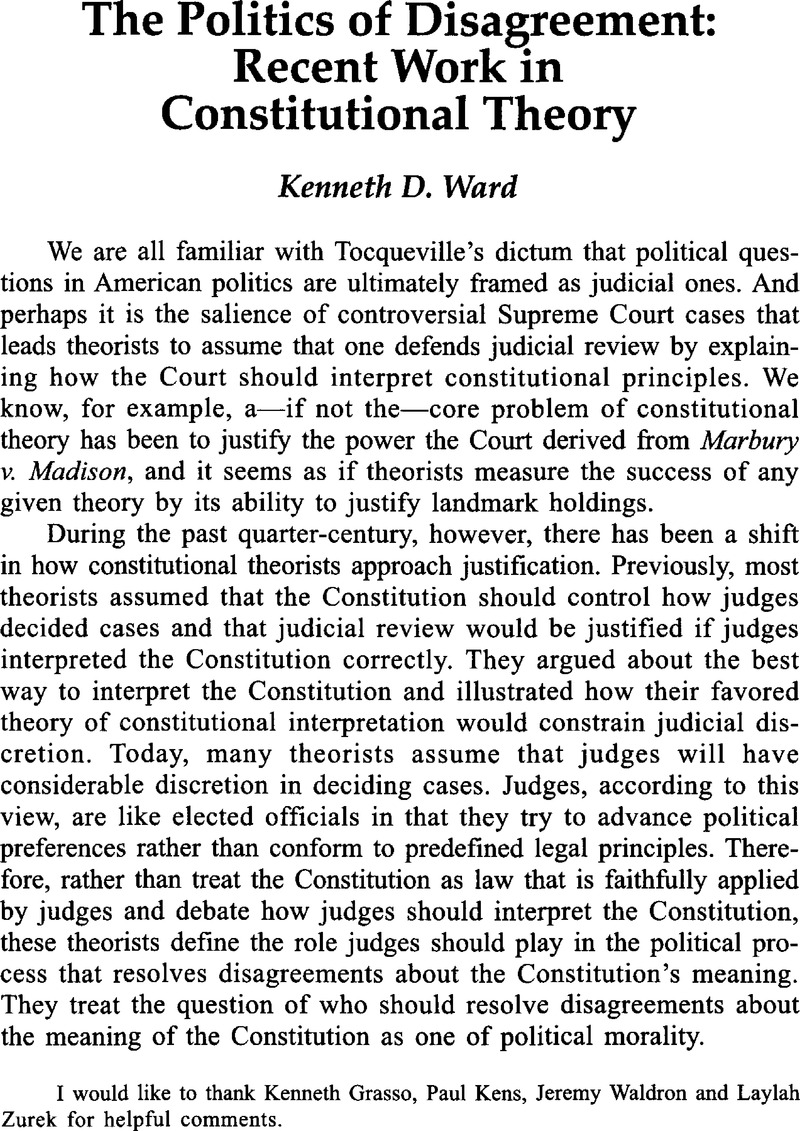Article contents
The Politics of Disagreement: Recent Work in Constitutional Theory
Published online by Cambridge University Press: 05 August 2009
Abstract

- Type
- Review Essay
- Information
- Copyright
- Copyright © University of Notre Dame 2003
References
1. That is not to say that Tushnet does not consider how decisions are made. At points, his argument seems to depend on the claim that the process of populist constitutional law better reflects the American historical experience. But this claim tends to merge into his argument that the substantive decisions of populist constitutional law will advance his vision of American democracy better than the decisions of judges.
2. Eskridge, William N. (“The Circumstances of Politics and the Application of Statutes,” Columbia Law Review 100 [2000]: 558–581)CrossRefGoogle Scholar recognizes Waldron's point that people disagree about democracy. But he seems to attribute the disagreement to the disenfranchisement of certain groups. His argument suggests that we can criticize this disenfranchisement by appealing to a procedural value as opposed to a substantive norm. While this suggestion is consistent with my claim that Waldron does not compare institutional structures in terms of procedural values Eskeridge, views the problem from the doctrinal perspective that I claim characterizes American constitutional theory. His claim seems to be that judicial decisions will address the problem of disenfranchisement.
3. Lastly, it should be noted that Ely anticipates his critics when he concedes that procedural values are normative in the sense that they reflect a political judgment and presumably in the sense that our choice of procedural values will influence the substantive decisions of the institutions that embody them. In other words, our choice of institutional structure will make certain substantive outcomes more likely and other outcomes less likely (p. 75n).
4. Note that this also suggests a response to Waldron's criticism of judicial review. Judicial review still might be justified because over time the Court has represented a plurality of views about justice.
5. Note that the reverse is true. If we were to amend the United States Constitution so as to eliminate the possibility of judicial review, we would reorient the political structure towards a different set of procedural values and make certain substantive decisions more likely than others. But the question of whether the change will advance the procedural value of equality is independent of the substantive decisions that follow from the less encumbered legislative process.
6. I would argue that theorists pay some attention to how judicial review influences case outcomes. We know, for example, that the famous Harvard Law Review Forewords often take this approach to recent Supreme Court cases. It is not clear, of course, whether these theorists view judicial review in terms of the way they would like cases decided or view the cases in terms of an understanding of the role judicial review plays in the government. More significantly, there is almost no attention paid to the procedural values that judicial review advances. We do not find many articles that consider the influence judicial review has that is independent of the Court's particular holdings.
- 1
- Cited by




